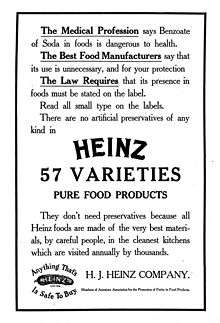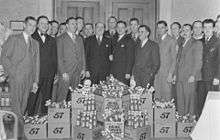Heinz 57

Heinz 57 is a shortened form of a historical advertising slogan "57 Varieties" by the H. J. Heinz Company located in Pittsburgh, Pennsylvania, United States. It has come to mean anything that is made from a large number of parts or origins. It was developed from the marketing campaign that told consumers about the numerous products available from the Heinz company.
Usage

Henry J. Heinz introduced the marketing slogan "57 Varieties" in 1896. He later claimed he was inspired by an advertisement he saw while riding an elevated train in New York City (a shoe store boasting "21 styles"). The reason for "57" is unclear. Heinz said he chose "5" because it was his lucky number and the number "7" was his wife's lucky number.[1] However, Heinz also said the number "7" was selected specifically because of the "psychological influence of that figure and of its enduring significance to people of all ages".[2] Whatever the reasons, Heinz wanted the company to advertise the greatest number of choices of canned and bottled foods for sale. In fact by 1892, four years before the slogan was created, the Heinz company was already selling more than 60 products.[3]
The first product to be promoted under the new "57 varieties" slogan was prepared horseradish.[4] By 1940, the term "Heinz 57" had become so synonymous with the company the name was used to market a steak sauce.
1934 Cookbook products
|
|
|
*Beefsteak Sauce was renamed Heinz 57 Sauce in 1940.[6][7]
Bottle design
The relatively high viscosity and thixotropic[8] nature of ketchup can make pouring it from a glass bottle somewhat difficult and unpredictable, and several urban legends surrounding this phenomenon have arisen. According to one popular folk remedy, repeatedly hitting the "57" mark on a glass Heinz ketchup bottle makes the ketchup pour out more quickly and easily. The New York Times suggests this is a matter of intentional design, with Heinz having placed the "57" mark on that particular spot of the bottle as a target for consumers to hit. According to the Heinz website, only 11% of people know this trick.[1]
Other uses
In Edmund Morris' The Rise of Theodore Roosevelt,xxvi, he says, “His ability to find common strains of ancestry with voters has earned him the nickname of ‘Old Fifty-seven Varieties.” Though it is not clear at what point in his career this was said of him.
In 1928, Jazz pianist and bandleader Earl "Fatha" Hines recorded his composition, "57 Varieties".
Jimmy Buffett mentions Heinz 57 in his 1978 hit song, Cheeseburger in Paradise.
Animals, especially dogs which are a mixture of multiple breeds, can be referred to as "Heinz 57".[9]
In bingo in the United Kingdom, a commonly used call for "57" is "Heinz variety".[10]
In draw poker, "Heinz 57" is a variant where 5’s and 7’s are wild cards.[11]
In UK betting terminology, a 'Heinz' refers to a full-cover bet of doubles and upwards, consisting of six selections. It is known as a Heinz because there are 57 multiples (15 doubles, 20 trebles, 15 fourfolds, 6 fivefolds and 1 sixfold) within the bet.[12]
The Heinz 57 is also a nickname for British Rail Class 57 locomotives.[13]
When Pittsburgh-based Heinz purchased the naming rights of Heinz Field in 2001, they signed a deal to pay the Pittsburgh Steelers $57 million until 2021.[14][15]
Heinz 57 figures in the plot of the novel The Manchurian Candidate when antagonist Mrs. Iselin lights upon a bottle of the product and adopts the number as an easy one for husband Senator John Iselin to remember as the number of Communists he charges are employed by the State Department. The 1962 film adaptation retains this, with a bottle of Heinz 57 sauce appearing on-screen moments before John Iselin cites the number in a speech.
The Post-Keynesian economist Hyman Minsky "used to say there are as many varieties of capitalism as Heinz has pickles, and that this very variety of capitalism is responsible for the resilience of capitalism" [16]
References
- 1 2 Rawsthorn, Alice (12 April 2009). "An Icon, Despite Itself". New York Times. Retrieved 2009-06-09.
- ↑ "57 Varieties, Revealed | The Bleat". Lileks.com. 2010-01-27. Retrieved 2011-10-12.
- ↑ "Trivia". Heinz. Retrieved 2011-10-12.
- ↑ "Trivia". Retrieved 13 March 2012.
- ↑ "Vintage Cookbooks - Heinz 57 Varieties". Advertisingcookbooks.com. Retrieved 2011-10-12.
- ↑ "Our Tangy History | Heinz 57 Sauce - 1913". Heinz57.com. Retrieved 2011-10-12.
- ↑ "Our Tangy History | Heinz 57 Sauce - 1940". Heinz57.com. Retrieved 2011-10-12.
- ↑ Barry, Patrick L.; Dr. Tony Phillips (10 August 2004). "The Great Ketchup Mystery". First Science.com. Retrieved 2009-06-09.
- ↑ Semyonova, Alexandra (2009). The 100 Silliest Things People Say about Dogs. Lulu.com. p. 67. ISBN 978-1904109181. Retrieved 2014-07-25.
- ↑ "Rhyming Calls in Bingo". Express Bingo. Retrieved 26 April 2012.
- ↑ "Heinz 57". poker.gamblefaces.com. Retrieved 2014-10-21.
- ↑ Leighton, Vaughan Williams; Siegel, Donald S. (2013). The Oxford Handbook of the Economics of Gambling. Oxford University Press. p. 369. ISBN 978-0199376698. Retrieved 2014-07-25.
- ↑ "List of UK railfan jargon - Trains". Train.spottingworld.com. Retrieved 2011-10-12.
- ↑ Deckard, Linda (2001-06-25). "Heinz Pours Itself Into $57 Million Naming Rights Deal In Pittsburgh". AllBusiness.com. Archived from the original on January 11, 2009. Retrieved 2008-08-05.
- ↑ "Stadium naming rights". Sports Business. ESPN.com. 2008-09-29. Retrieved 2008-08-05.
- ↑ http://papers.ssrn.com/sol3/papers.cfm?abstract_id=179455
External links
| Look up Heinz 57 in Wiktionary, the free dictionary. |